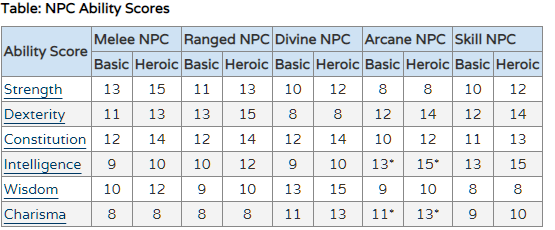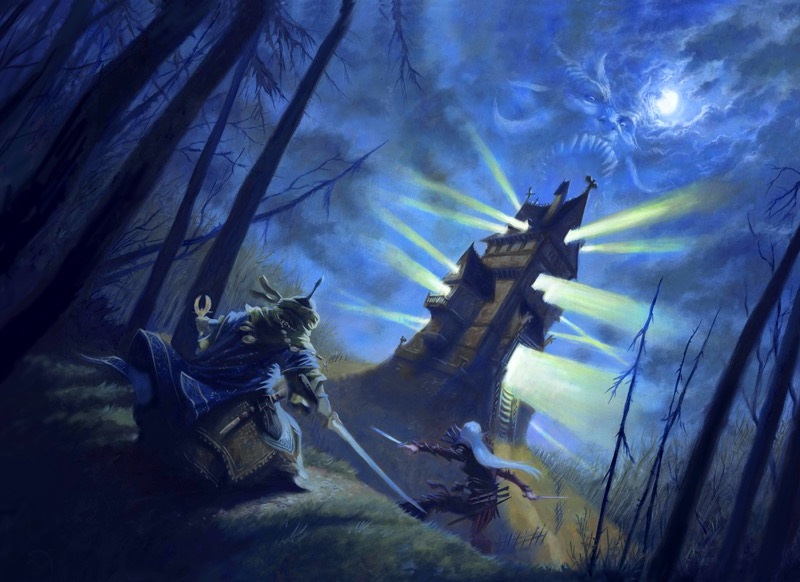Hello, my name is James and welcome to Code/Switch, today I want to talk about ability scores. I don’t want to talk about every ability score today; I just want to focus on strength and constitution. I like how quantified ability stats are in Pathfinder, but actually getting the numbers is an inexact science, it’s more art and occult rituals in all honesty.
It’s hard to quantify mental statistics like intelligence, wisdom, and charisma, as there are many facets where a person can be poor in one aspect of a concept, but good in another. Intelligence in particular is a difficult one as it seems to be a measure of just memorization, but a more modern view of intelligence is the ability to adapt to new situations. Pathfinder’s expression of intelligence would have an encyclopedia robot have a higher score than an actual scientist, as the robot would have a higher base knowledge on a lot of topics while the scientist would be more specialized. This is separate from the Core Rulebooks explanation of intelligence as the uses in the game are based around knowledge skills, using magic, and making leather jackets.

If the caster you’re fighting has an ornate leather spell component pouch, you know you’re in for a world of hurt.
Physical attributes would seem more cut and dry, but often the attributes are used to determine multiple facets of their chosen title. Strength seems like it would be clear cut, how buff you are. While it works that way for carrying capacity and weapon damage, it also somehow impacts the ability for melee weapons to hit, to climb, and for swimming. Hitting with a weapon is a skill based action that purely being strong doesn’t grant. Similarly, strength helps with swimming and climbing, but endurance is a more important factor beyond the base ability to move your body under your own power. By the same token constitution is used to measure vitality, endurance, and how good your immune system is. There are different types of endurance, just ask a sprinter to run a marathon. Also coupling your vitality to your immune health and disease resistance is a false dichotomy that the system uses for simplicity.
We’re not here to trash on attribute scores, in fact, I rather like finding things in the rules that you can do in real life to estimate where you’d be in game. To this end I want to point to two rules that can help estimate your strength and constitution scores. For a real measure we’d probably need to find some other tests and average them together, but today were just going to run one test for each score. The first is checking our carry capacity for strength and the second is holding our breath for constitution.

You can also ask other people to hold their breath as a test for intelligence, it just has an inverse relationship as opposed to the positive relationship constitution has.
I’ll just be the test dummy for this. In regards to carrying capacity, I’m not going to lift things in my house, my wife will be mad if I move everything around. I’m going to use the heaviest thing I’ve ever lifted, and I’m not going to call it out because I don’t want it to be embarrassed. The thing I lifted was roughly 200lb, and according to the carry capacity rules; “A character can lift as much as double his maximum load off the ground, but he or she can only stagger around with it” which is totally what I did. Carrying a heavy load of 154-230 would give a strength score of 16, and because I was staggering with it, I cut the load amount in half to determine my heavy load, ½ of 200 is 100, and a 100 pound heavy load lands me with a 12 strength score. While it’s above the 10 average, I still don’t feel happy, I was a few years younger and doing more physical work and sports, I’d wager my strength is actually closer to a 10 now, but I’m not going to throw my back out testing that idea.
In regards to constitution, we’re going to use the rules in swimming for holding your breath. Those rules state that “You can hold your breath for a number of rounds equal to twice your constitution score, but only if you do nothing other than take move actions or free action.” To test this I’m going to set a stopwatch and hold my breath while laying still, taking my free actions. For convenience move actions are included in the definition, but I also believe that to be an exception made for ease of play; you create more CO2 when moving then when still. So, doing the testing under idea circumstances; calm environment, laying on a bed not moving, I managed to hold my breath for 2 minutes and 30 seconds. I’ve always been pretty good at holding my breath and, with all my practice holding it through tunnels. (Side note, other people do that superstition right? I’m not crazy right?). I could honestly probably get to 2:45-3 minutes, maybe I’ll try it when the wife is home. According to the rules for holding your breath, your breath holding ability is rounds equal to x2 constitution score, a round is 6 seconds and with holding my breath for 2:30, I held it for 25 rounds and ½ of 25 rounds is 12.5, rounding down to 12 because rounding in Pathfinder is never in your favor. If I were to be able to hold my breath for 3 minutes, it’d give me a constitution score of 15, but I guess I’ll have to be happy with 12.

My tests give me a 12 strength and a 12 constitution, putting me in line with the stats of a heroic Skill NPC, or a basic Divine NPC. Using these tests, where would you end up? Some notes on the tests, don’t hurt yourself, you can hold your breath until you pass out, and that’s bad. Similarly lifting stuff can be dangerous, and working backwards from drag can be misleading, pushing a car isn’t the same as dragging a box, and the rulebook makes it seem like the second would be a more accurate test for strength. Any other ideas for attribute tests, you can find me and the rest of the KD Crew at our Discord!







